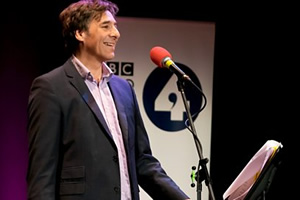
Mark Steel's In Town
- Radio stand-up
- BBC Radio 4
- 2009 - 2024
- 73 episodes (13 series)
Mark Steel visits a town in Britain and investigates its society & history before performing a bespoke stand-up show for locals.
- Due to return for Series 14
Episode menu
Series 2, Episode 3 - Dumfries
Further details
This week, Mark is the Theatre Royal in Dumfries, on the Scottish Border, which is a town which is obsessed with the poet Robert Burns, despite the fact that he only lived there for the last five years of his life.
Mark talks about the local tourist highlights, include the fact that The Wicker Man was filmed nearby and that there is an annual festival devoted to the film, which is something Mark things the town should not boast about considering what the film was about. He then talks about the writer Frank Cottrell Boyce who wrote about a local art gallery where you could get up close to the paintings. So close in fact that the paintings got stolen.
He then talks about the dower atmosphere. John Laurie, who came from Dumfries, once said in an interview that he would meet up with the locals who claimed that he was "alright" on the TV, which was the highest praise he got from locals.
Mark then talks about the town's dislike of seagulls. There are plans to deal with the "dive bombing" which often occurs in Dumfries. However, the most recent major issue concerning Dumfries is the floods that struck in 2009 which did not get as much coverage as those in Cumbria.
He then talks about the local football club, the pompously named Queen of the South. When the club was founded, other suggests for names were Queen of the South United and Queen of the South Wanderers.
Mark then talks about one of his new favourite books: Queen of the South - The History, which does contain a lots of stats, but does have the sentence, "In 1939, there wasn't just concern for the future of the country - it was also a troubling time for Queen of the South." It also says; "Queen of the South left Forfar having clinch the title with a goal average of 1.9714285 compared to Stirling Albion's of 1.772."
Mark looks at the less violent bits of Dumfries, including the camera obscura, a Victorian building which has a large disc in it which has a lens in it which is pulled by ropes. So depending on the angle, you can see what is outside being reflected on the disc. You can see 60 miles away.
He then gets to subject of Dumfries's most famous resident, Robert Burns. Burns made no money from most of his poems during his early life. He came to Dumfries to take over a farm and later became the local customs officer. When the French revolution occurred, Burns wrote a poem called The Tree of Liberty to celebrate it.
Burns eventually earned enough money to sell his farm and move to a second-floor flat, but his wife wanted him to bring her favourite cow to the new flat and let it graze out of the back. In February 1792, Burns found an armed ship controlled by smugglers. As his friends went to get help, Burns watched. 40 dragoons turned up and Burns ordered them to chase the smugglers away. The smugglers ran away, leaving behind their goods, including four cannon guns. Under law, the cannons were auctioned. Burns however bought them himself and sent to France to be used to help the revolution he cared for.
Broadcast details
- Date
- Wednesday 21st April 2010
- Time
- 6:30pm
- Channel
- BBC Radio 4
- Length
- 30 minutes
Cast & crew
| Mark Steel | Host / Presenter |
| Mark Steel | Writer |
| Pete Sinclair | Writer (Additional Material) |
| Julia McKenzie | Producer |
